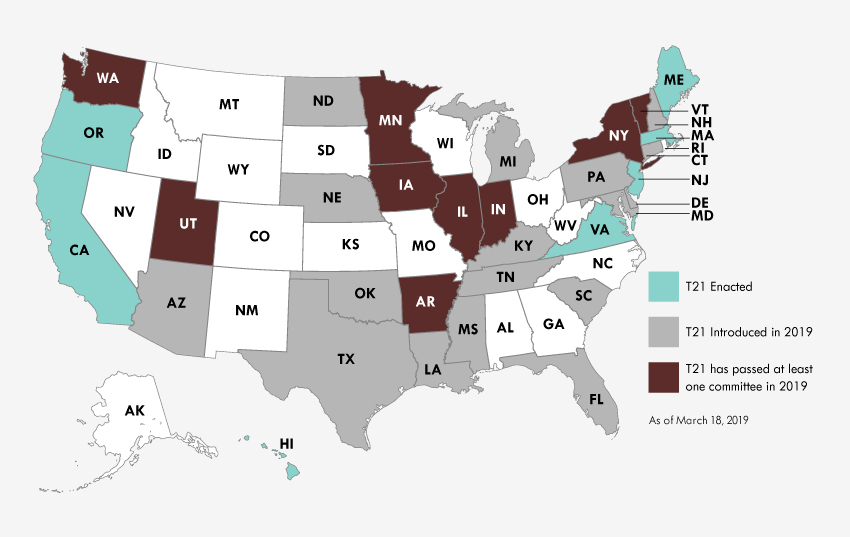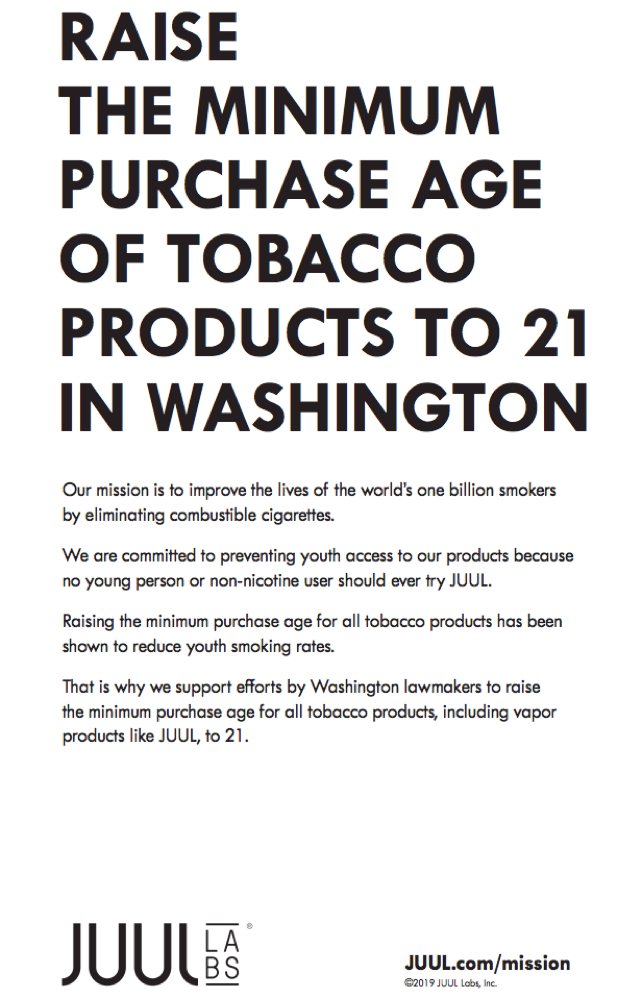JUUL Labs Taking Action To Push Tobacco 21 Laws in the U.S.
Policy, Underage Use Prevention
March 19, 2019
We know Tobacco 21 policies work. In areas where they are already enacted, smoking rates are falling. In the months after California enacted Tobacco 21 statewide, for example, tobacco sales to minors dropped by 45 percent. High school smoking rates in Needham, Massachusetts plunged 47 percent after they raised the purchasing age to 21 years.
While raising the legal age to purchase tobacco products to 21 is not the only strategy for reducing underage use, we believe it is critical because it will prevent high-school seniors and recent high-school graduates from purchasing tobacco products and sharing them with underage users. We know that “social sourcing”—obtaining tobacco products from friends or siblings who are of legal age—is currently how a large swath of youth users access these products.
JUUL Labs supports Tobacco 21 legislation wherever it is active, which is currently Arkansas, Connecticut, Delaware, Illinois, Kentucky, Maryland, Minnesota, New York, Utah, Vermont, Virginia, Washington, and West Virginia – states that collectively account for more than 23 percent of the nation’s population. Another 28 percent of Americans already live in a state or locality with Tobacco 21 laws. We urge lawmakers in states without these age protections to follow their example, and when and if they do, we will proudly support their efforts.

Soon, that means nearly half of Americans may live in states with Tobacco 21 laws; but we think it’s critical to pursue a federal law as well. Research from the Institute of Medicine estimates that enacting Tobacco 21 at the federal level would result in 249,000 fewer premature deaths among young people born since 2000. It would also cause a 25 percent reduction in the number of new high school age smokers, and a 15 percent decline in the number of new smokers under the age of 21.

We are currently running ads to support Tobacco 21 laws in Arkansas, Connecticut, Delaware, Florida, Illinois, Indiana, Iowa, Kentucky, Louisiana, Maryland, Michigan, Minnesota, New Hampshire, New Mexico, New York, Oregon, South Carolina, Texas, Tennessee, Vermont, Utah, Vermont, Washington, and Washington, D.C.
In addition to JUUL Labs’ advocacy for Tobacco 21 legislation, we are also leading the category in other youth-prevention efforts. In November 2018, we implemented a comprehensive action plan to address youth access, appeal, and use of JUUL products. We overhauled how we run our business with a renewed focus on these efforts. Since then, we have taken aggressive action and have kept every single commitment we made, including:
Restricting Sale And Distribution Of Flavored Products
- We suspended the distribution of non-tobacco and non-menthol-based flavored JUUL products (Cucumber, Fruit, Mango, and Creme) to distributors and brick-and-mortar retailers in November 2018.
Strengthening Our Online Sales Controls
- We enhanced our already industry-leading age-verification protections on JUUL.com, including two-factor authentication and use of facial-recognition technology to verify identity. This is the only place we currently sell Cucumber, Fruit, Mango, and Creme.
Strengthening Retail Compliance
- We expanded our secret shopper program by 4X with escalating penalties for non-compliance and are imposing financial penalties on retailers who are subject to FDA Civil Monetary Penalties.
Exiting U.S. Social Media
- We shut down our U.S.-based Facebook and Instagram accounts. Twitter is only used for non-promotional purposes. We are also continuing to work with social media platforms to remove inappropriate third-party content.
Technology Solutions
- We are establishing traceability for JUUL products to identify bad-actor retailers that continue to sell products to youth and are developing next-generation products with user-level access restrictions to prevent youth use.
We’re encouraging others in the industry to take these same steps, effectively resetting the vapor category. We believe these comprehensive actions, along with Tobacco 21 laws, can successfully address this public health concern while preserving access for adult smokers looking for an alternative to combustible cigarettes.
Other Posts
February 3, 2025
JUUL LABS STATEMENT ON KEY PROVISION OF THE ADMINISTRATION’S TARIFF PACKAGE
Juul Labs, Inc., an American technology and innovation company, commends President Trump’s efforts to protect American citizens through increased enforcement of trade laws and…
January 15, 2025
JUUL LABS’ STATEMENT ON THE PROPOSED RULE TO CAP NICOTINE IN CIGARETTES
The FDA’s 2017 Comprehensive Plan laid out a powerful roadmap for reducing smoking rates in America and the associated premature death and disease caused…
September 6, 2024
STATEMENT ON 2024 NATIONAL YOUTH TOBACCO SURVEY RESULTS
Juul Labs is encouraged to see another year of continued decline in underage use of vapor products in general, and JUUL products specifically. Overall,…

